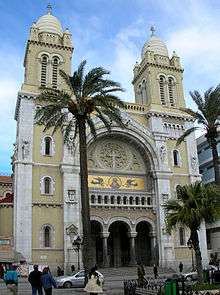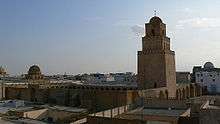Religion in Tunisia
Faiths
Islam
The majority of Tunisians consider themselves to be Muslim,[2] who according to Pew are 58% Sunni and 40% nondenominational Muslim.[1] Also a small number of Ibadhi Muslims still exist among the Berber-speakers of Jerba Island.
The government controls and subsidizes mosques and pays the salaries of prayer leaders. The President appoints the Grand Mufti of the Republic. The 1988 Law on Mosques provides that only personnel appointed by the Government may lead activities in mosques and stipulates that mosques must remain closed except during prayer times and other authorized religious ceremonies, such as marriages or funerals. Some people may be interrogated just for associating or being seen in the street with practicing Muslims. New mosques may be built in accordance with national urban planning regulations; however, upon completion, they become the property of the Government. The Government also partially subsidizes the Jewish community.
There is a small indigenous Sufi Muslim community; however, there are no statistics regarding its size. Reliable sources report that many Sufis left the country shortly after independence when their religious buildings and land reverted to the government (as did those of Orthodox Islamic foundations). Although the Sufi community is small, its tradition of mysticism permeates the practice of Islam throughout the country. There is a small indigenous "Maraboutic" Muslim community that belongs to spiritual brotherhoods known as "turuq".[2] The Muslim holidays of Eid al-Adha, Eid al-Fitr, and Mawlid are considered national holidays in Tunisia.
Christianity

The International Religious Freedom Report of 2007 reported that the Christian community numbered 50,000 people, with 20,000 of whom Catholics, and was composed by indigenous Berber residents, Tunisians of Italian and French descent, and a large group of native-born citizens of Arab descent, dispersed throughout the country.[2] In the Annuario Pontificio of 2018, the number of Catholics is estimated to have risen to 30,700.[3]
From the late 19th century to after World War II, Tunisia was home to large populations of Christian French, Italian and Maltese descent (255,000 Europeans in 1956).[4]
The Roman Catholic Church in Tunisia, which forms the Archdiocese of Tunis, operates 12 churches, 9 schools, several libraries, and 2 clinics.[2] In addition to holding religious services, the Catholic Church opened a monastery, freely organized cultural activities, and performed charitable work throughout the country.[2] According to church leaders, there are 2,000 Protestant practicing Christians, International Religious Freedom Report for 2007 estimates thousands of Tunisian Muslims have converted to Christianity.[2] The Russian Orthodox Church has approximately 100 practising members and operates a church in Tunis and another in Bizerte.[2] The Reformed Church of France maintains a church in Tunis, with a congregation of 140 primarily foreign members.[2] The Anglican Church has a church in Tunis with several hundred predominantly foreign members.[2] There are 50 Seventh-day Adventists.[2] The 30-member Greek Orthodox Church maintained 3 churches (in Tunis, Sousse, and Djerba).[2] Occasionally, Catholic and Protestant groups held services in private residences or other locations.[2] Scattered among the various churches, though mostly evangelical, are also a number of Christian believers from Muslim backgrounds. A 2015 study estimates some 500 such individuals in Tunisia.[5]
Tunisia is seen as a great symbol of religious co-existence and harmony. Tunisians never ask religious background for the people, regardless Muslims or Christians.[6] It is common to see Christian–Muslim coexistence in Tunisia together, although the Government discouraged religious converts.[7]
Judaism
Judaism is the country's fourth largest religion with 2,000 members.[2] One-third of the Jewish population lives in and around the capital, and is descended predominantly from Israelite and Spanish immigrants.[2] The remainder lives on the island of Djerba, where the Jewish community dates back 2,600 years.[8]
Baha'i faith
The Bahá'í Faith in Tunisia begins circa 1910[9] when the first Bahá'í arrives, possibly from Egypt.[10][11] In 1963 a survey of the community counted 1 assembly and 18 organized groups (between 1 and 9 adults) of Bahá'ís in Tunisia.[12] US State Department 2001 estimates mention the Bahá'í community at about 150 persons.[13] However Association of Religion Data Archives and several other sources point to over 1,000 Bahá'ís in the country.[14][10][15]
Freedom of religion
The Constitution of Tunisia provides for freedom of religion, belief and the freedom to practice the rites of one's religion unless they disturb the public order; however, the government imposes some restrictions on this right. The Constitution declares the country's determination to adhere to the teachings of Islam and stipulates that Islam is the official state religion and that the president must be Muslim. The government does not permit the establishment of political parties on the basis of religion and prohibits efforts to proselytize. Although changing religions is legal, there is great societal pressure against Muslims who decide to leave Islam.
In 2017 a handful of men were arrested for eating in public during Ramadan, they were convicted of committing “a provocative act of public indecency” and sentenced to month-long jail sentences. The state in Tunisia has a role as a "guardian of religion" which was used to justify the arrests.[16]
The government allows a small number of foreign religious charitable nongovernmental organizations (NGOs) to operate and provide social services.
Notes
- Other figures from the main page rounded the decimals to the nearest whole number
References
- "Chapter 1: Religious Affiliation". The World’s Muslims: Unity and Diversity. Pew Research Center's Religion & Public Life Project. August 9, 2012. Retrieved 4 September 2013.
- International Religious Freedom Report 2007: Tunisia. United States Bureau of Democracy, Human Rights and Labor (September 14, 2007). This article incorporates text from this source, which is in the public domain.
- "Tunis (Latin (or Roman) Archdiocese) [Catholic-Hierarchy]". www.catholic-hierarchy.org. Retrieved 2019-06-08.
- Angus Maddison (20 September 2007). Contours of the World Economy 1–2030 AD:Essays in Macro-Economic History: Essays in Macro-Economic History. OUP Oxford. p. 214. ISBN 978-0-19-922721-1. Retrieved 26 January 2013.
- Johnstone, Patrick; Miller, Duane Alexander (2015). "Believers in Christ from a Muslim Background: A Global Census". Interdisciplinary Journal of Research on Religion. 11: 15. Retrieved 20 October 2015.
- https://www.africanews.com/2018/08/22/tunisians-preach-tolerance-as-muslims-jews-join-christian-celebration/
- https://www.alaraby.co.uk/english/indepth/2017/8/29/lifting-the-veil-religious-freedoms-in-tunisia
- "Pilgrims flock to Tunisia's Djerba Jewish festival | Lamine Ghanmi". AW. Retrieved 2020-03-17.
- Temple, Bernard (May 27, 1910). "Persia and the Regenerations of Islam". Journal of the Royal Society of Arts. 58 (2001): 652–665. Retrieved 2013-08-03.
- Khlifi, Roua (26 February 2013). "Tunisia's Spiritual Pluralism: The Baha'i Faith". Tunis is Alive. Archived from the original on 6 March 2013. Retrieved 2013-08-03.
- Hassall, Graham (c. 2000). "Egypt: Baha'i history". Asia Pacific Bahá'í Studies: Bahá'í Communities by country. Bahá'í Online Library. Retrieved 2013-08-03.
- Compiled by Hands of the Cause Residing in the Holy Land. "The Bahá'í Faith: 1844–1963: Information Statistical and Comparative, Including the Achievements of the Ten Year International Bahá'í Teaching & Consolidation Plan 1953–1963". pp. 118–119.
- U.S. State Department (September 14, 2001). "International Religious Freedom Report 2001: Tunisia". The Office of Electronic Information, Bureau of Public Affair. Retrieved 2013-08-03.
- "Most Bahá'í Countries". International > Regions > Northern Africa. The Association of Religion Data Archives. 2010. Retrieved 2013-08-03.
- "Tunisia: Treatment of Bahai's (or Baha'is) by non-Bahai's and Tunisian authorities; whether they have been targets of threats and/or violence; police attitude towards Bahai's, police response to complaints lodged by Bahai's and police protection available". Immigration and Refugee Board of Canada. 17 April 2003. TUN41362.E. Retrieved 2013-08-03.
- "The country where people are forced to observe Ramadan". The Independent. 2017-06-13. Retrieved 2017-08-08.
